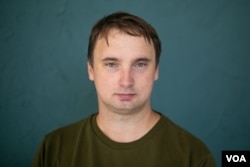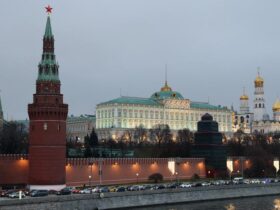Ahead of Belarus’ presidential election this weekend, a media advocacy group filed a complaint with the International Criminal Court on Friday, accusing the country’s longtime leader of crimes against humanity against journalists.
The complaint filed by Reporters Without Borders, known by the French acronym RSF, accused President Lukashenko of a harsh crackdown on independent media that began after he claimed victory in the disputed 2020 election.
That election was widely seen as rigged, with opposition candidates jailed or forced to flee. Security forces violently suppressed subsequent mass protests.
In its complaint, Paris-based RSF cited the imprisonment and harassment of journalists and the execution of media workers as examples of crimes against humanity.
“RSF calls on the ICC Prosecutor to include theses crimes against journalists in his preliminary investigation,” Antoine Bernard, RSF’s director of advocacy and assistance, said in a statement.
Since the crackdown on independent media began, Belarus has ranked among the worst jailers of journalists in the world, according to the Committee to Protect Journalists.
Belarusian media experts say the harsh environment has made it difficult to access reliable information.
“The Belarusian information space is tightly controlled by the government,” Natalia Belikova, head of international cooperation at Press Club Belarus, told VOA from Warsaw.
He said that repression against journalists and activists has increased in the run-up to the elections. Press Club Belarus currently jails more than 40 journalists in the country.
European Parliament and exiled Belarusian leader Svetlana Tikhanovskaya described the upcoming elections in Belarus as a sham.
Since 2020, the Belarusian government has put pressure on independent media through raids on news outlets, blocking websites and designating media organizations as “extremist”.
The harsh environment forced some journalists to leave their jobs. Meanwhile, hundreds of other journalists fled into exile, according to the Belarusian Association of Journalists.
“For five years, the Belarusian regime has systematically persecuted independent voices, starting with journalists,” Jean Cavalier, head of RSF’s Eastern Europe and Central Asia desk, said in a statement.
Belikova said she felt the complaint was important for the ICC.
“At the level of raising the profile of repression in Belarus, especially against journalists and the independent press, I think this is a very important step,” she said.
But Belikova said she was not considering whether the complaint seeks to improve the crisis faced by Belarusian journalists.
The ICC Prosecutor’s Office said it does not comment on complaints, but confirmed that it had received one from RSF.
The Belarusian Foreign Ministry did not immediately respond to VOA’s email requesting comment for this story.
According to the analyst, the attack on independent media is born out of an environment where state-run propaganda can flourish.
Starting last week, the Belarusian state-run television network Onts has aired a series of propaganda films featuring three jailed journalists. Journalists are seen in prison facilities, being asked questions, being searched and prodded.
The journalists – Ihr Losik and Andrey Kuznecheck, who work for VOA’s sister outlet Radio Free Europe/Radio Liberty, and Ihr Karny, who previously contradicted for RFE/RL – are jailed over press freedom groups, Which are politically motivated.
Ont’s propaganda series accused the journalists of trying to “set Belarus on fire”.
“This is a very bad and malicious practice. This is against all human rights,” Belikova said about the interview.
Belikova said that the purpose of the interviews was likely to discredit RFE/RL in the eyes of Belarusians. RFE/RL’s Belarusian service is one of the main independent outlets providing independent news to people inside the country.
RFE/RL said it had no comment on the interview series.
Despite the spread of state-run propaganda, Belarusians still regularly access restricted news sites.
According to the 2024 JX Fund report, the five largest sites had more than 17 million visits in December 2023. The population of Belarus is approximately 9 million people.








Leave a Reply